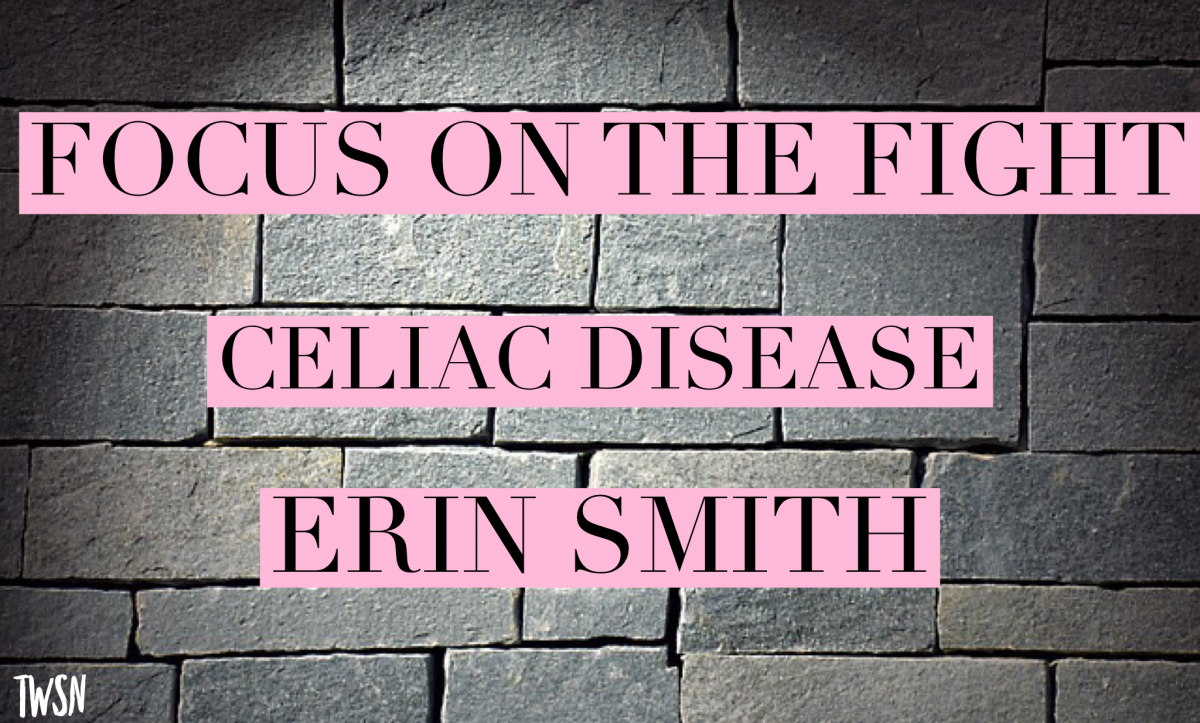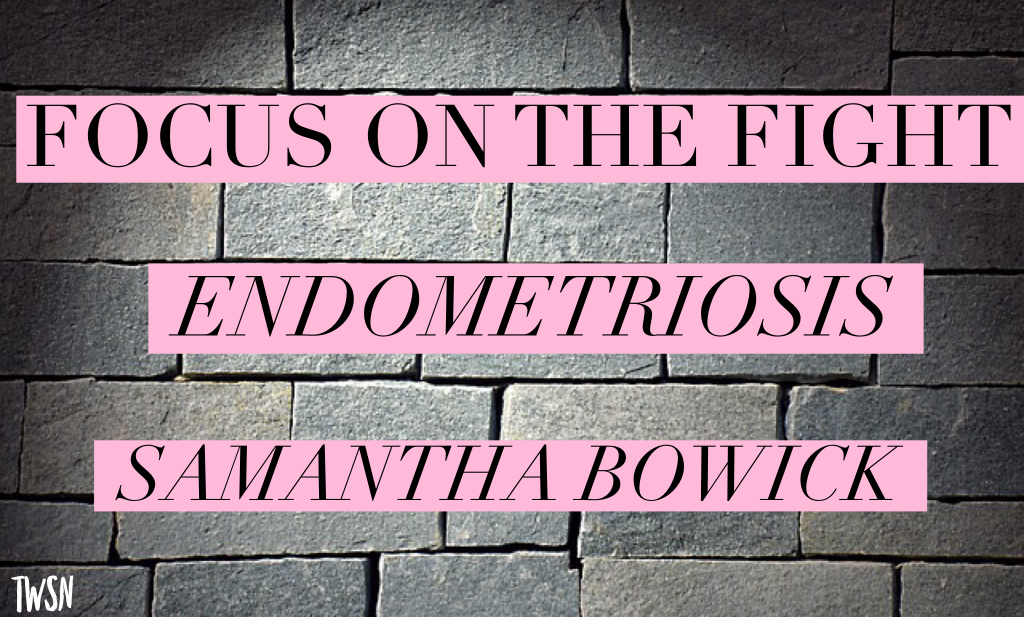Welcome to Focus On The Fight (previously called Spoonie Spotlight), a series of interviews that will be posted every Friday, focusing on a blogger and their chronic health issues.
This week we will meet Erin Smith who has CELIAC DISEASE.
Erin is 40 years old and lives in NYC. She was diagnosed with celiac disease in 1981 WAY before being gluten-free was “trendy.” She has Celiac Disease, Hashimoto’s Disease and food allergies. For today’s interview we will focus on Celiac Disease.
According to the Celiac Disease Foundation Celiac Disease is an autoimmune disease which can be very serious. It is said to occur in those who are genetically predisposed to the condition due to ingestion of gluten causes damage to to the small intestine. The foundation estimates that 1 in 100 people are affected worldwide. And they believe that approximately 2.5 million Americans are undiagnosed and at risk for possible long-term complications.
When a person who has Celiac Disease eats something containing gluten (which is a protein that is found in wheat, rye or barley) an immune response occurs attacking the small intestine. Such an attack causes damage to fingerlike projections that line the small intestine called villi. These projections promote nutrient absorption, and once they are damaged the body can no longer properly absorb nutrients.
Celiacs disease is hereditary and those with a first-degree relative with celiacs disease (Ex parent, sibling or child) have a 1 in 10 risk of developing the condition.
Symptoms of Celiac Disease
- unexplained weight loss
- irodeficiency anemia
- fatigue
- bone or joint pain
- arthritis
- osteoporosis or osteopenia (bone loss)
- liver and biliary tract disorders (transaminitis, fatty liver, primary sclerosing cholangitis, etc.)
- depression or anxiety
- peripheral neuropathy (tingling, numbness or pain in the hands and feet)
- seizures or migraines
- missed menstrual periods
- infertility or recurrent miscarriage
- canker sores inside the mouth
- dermatitis herpetiformis (itchy skin
Now that we all know a little bit about Erin and the condition she lives with I would like to share the entirety of Erins’s Interview
How long did it take you to get diagnosed? Now that you have been diagnosed and can look back at your past, is there an event that you can pinpoint as a are now that at the time you didn’t know what it was?
I was too young to remember my diagnosis and feel lucky that I was diagnosed so quickly. On average, it takes 6-10 years to get a celiac disease diagnosis. I was diagnosed in 1981 and it took about 7 months from symptoms on-set to diagnosis. My doctor at the time was even younger than my parents!
Please share how your health impacts your daily life!
I have to say that celiac disease doesn’t really impact my daily life unless I accidentally eat gluten. I have been managing my disease for so many years now that I feel I have a really good handle on how to eat and live safely gluten-free. My thyroid disease has been up and down over the years but I work closely with my doctor to monitor my medication dosage.
Have you noticed that your health has impacted any of your current or previous relationships!? If so, how?
My husband had no clue what celiac disease or eating gluten-free meant before we met. Now, he is super careful if he ever brings gluten into our house (which is rare). He also has become a great advocate for me when we are dining out and I have questions about food ingredients and preparation. He has learned so much!
In what way has your life changed since your diagnosis? Is there anything that you cannot do now that you could do before diagnosis?
I haven’t been eating gluten since my diagnosis. I was too young to remember most foods but there are denitely gluten-lled foods out there that I wish I could try once in my life. The risks and my body’s reaction outweigh the taste, though, and I would NEVER cheat. It’s too much for my body to handle.
How do you know when you are experiencing a flare?
I know immediately! If I eat gluten by mistake, it’s almost like instant food poisoning. There is really no denying what is going on with my body. My reaction time is usually one hour or less.
What do you do to treat your flares? Or to make your bad days better?
If I eat gluten by mistake, I get violently ill almost immediately. Unfortunately, I have to let it ride out. I usually vomit for hours and then suffer from complete exhaustion. I make sure to keep hydrated and call the doctor if the most severe symptoms last more than 24 hours. I never beat myself up over an accidental “glutening”. Even the most vigilant person with celiac disease has the chance of getting sick from food. I always take it easy for a number of days after getting sick. It’s the only way my body can recuperate.
In closing, I asked Beth what she would say if there was one only piece of advice she could share with those living with a chronic illness. She said, “Be patient! If you have been suffering and undiagnosed for a long time, it could take a very long time to heal your body. You will not feel better overnight, it could take months or years depending on the severity of the damage to your GI tract. Educate yourself on all of the places gluten can hide including sauces, beverages, soups, and so much more. It’s not just in bread, pastas, and baked goods! Also, learn about the risks of cross-contamination in the kitchen and how to avoid being glutened by mistake. Reach out to support groups both online and in person to learn how to navigate your celiac disease diagnosis.”
I also asked Erin what one piece of advice she would give to someone going through the diagnosis process, or is newly diagnosed. She said, “Too many people go undiagnosed or misdiagnosed for so long that it can gravely impact their lives. I’ve had friends suffer greatly before their diagnosis. Having celiac doesn’t mean you have to stop living, it just means you have to do a lot of pre-planning and research to feed yourself safely. While there are additional autoimmune diseases related to celiac disease, celiac itself is manageable with a lifelong gluten-free diet. Please never let celiac stop you from living a full life and from seeing the world!”
I would like to thank Erin for sharing her story with us. She has such a passion and drive to share about Celiac Disease and educate others about this condition and others. Please take a moment to check out her social media platforms.
For more information on Celiac Disease please check out The Celiac Disease Foundation
If you would like to be featured please visit the contribute tab here on this site or contact me at amber@theworldseesnormal.com
With Love,
Amber



